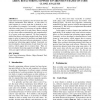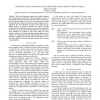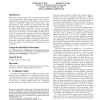7 search results - page 1 / 2 » Examining the effectiveness of using concolic analysis to de... |
IASTEDSEA
2004
13 years 6 months ago
2004
Code clone has been regarded as one of factors that make software maintenance more difficult. A code clone is a code fragment in a source code that is identical or similar to anot...
WCRE
2010
IEEE
13 years 2 months ago
2010
IEEE
—There are numerous studies that examine whether or not cloned code is harmful to software systems. Yet, few of them study which characteristics of cloned code in particular lead...
C3S2E
2008
ACM
13 years 6 months ago
2008
ACM
In the last decade, a great many code clone detection tools have been proposed. Such a large number of tools calls for a quantitative comparison, and there have been several attem...
WWW
2011
ACM
12 years 11 months ago
2011
ACM
Malicious web pages that host drive-by-download exploits have become a popular means for compromising hosts on the Internet and, subsequently, for creating large-scale botnets. In...
ACSAC
2002
IEEE
13 years 9 months ago
2002
IEEE
In this paper we present PEAT: The Portable Executable Analysis Toolkit. It is a software prototype designed to provide a selection of tools that an analyst may use in order to ex...



